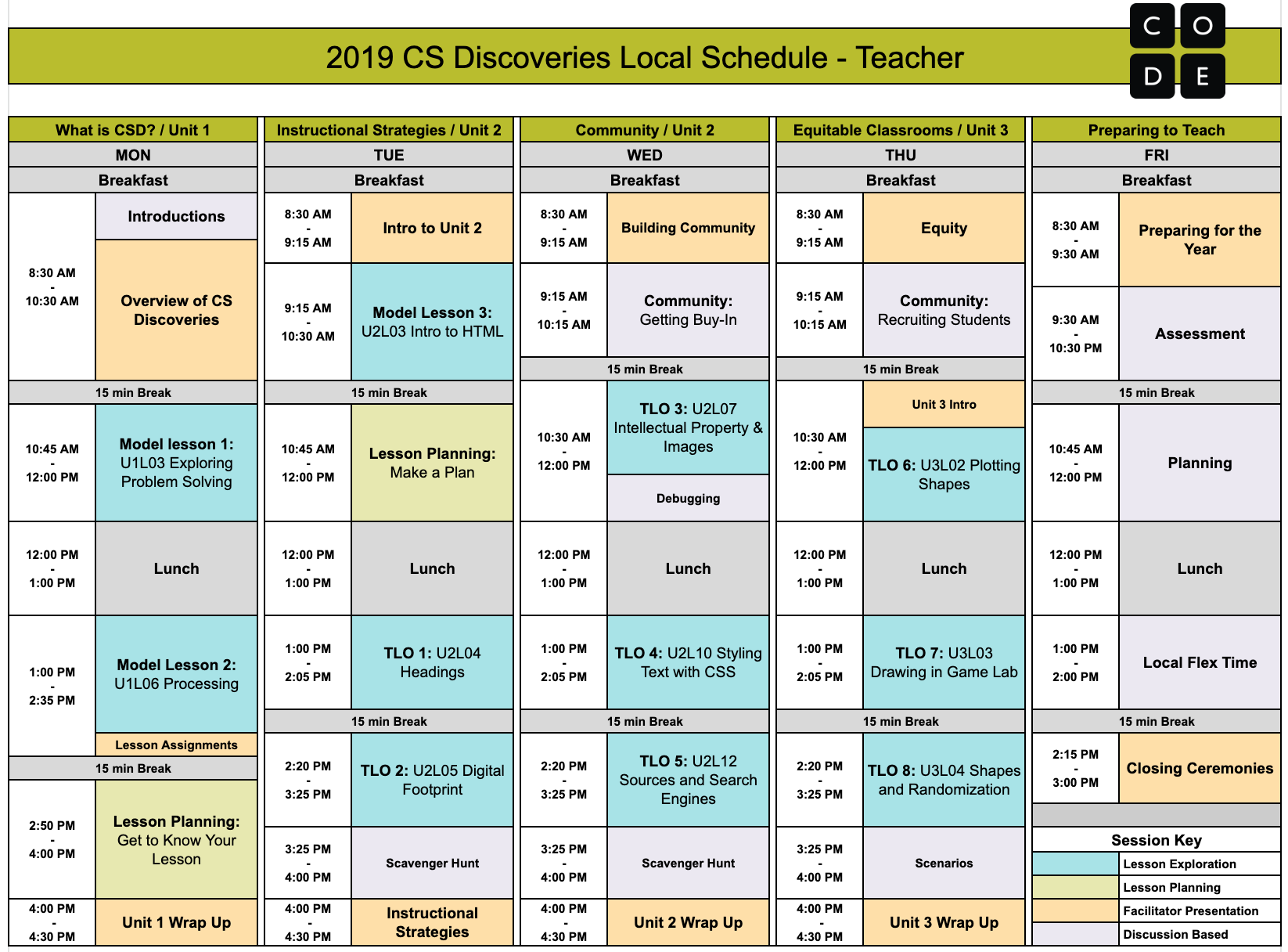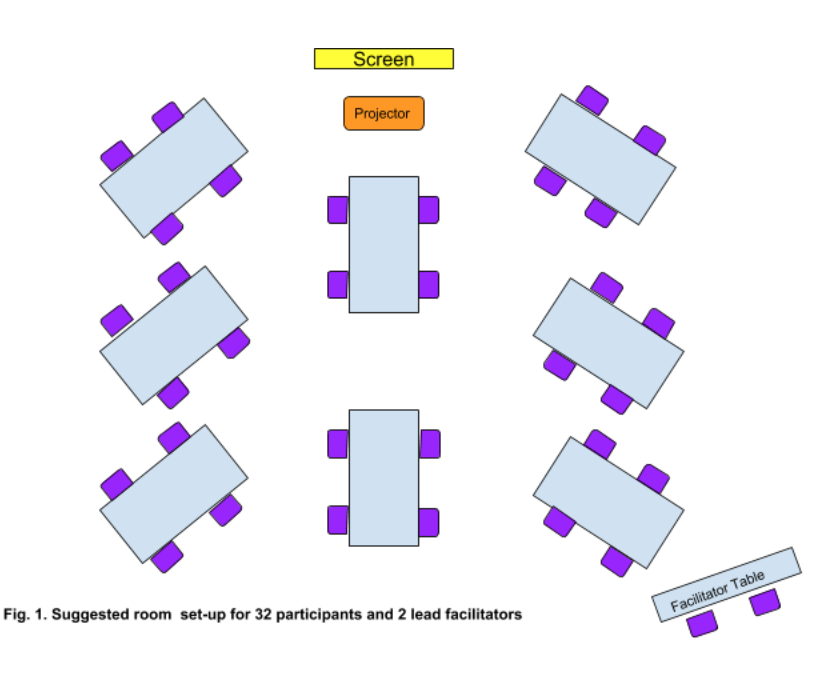2019 CS Discoveries Local Summer Workshop
This is the detailed facilitator agenda for a Local Summer Workshop, which is a 5 day in-person training to prepare teachers to start teaching CS Discoveries. It focuses on the first semester of the course.
Printing Agendas
- PDF of Local Workshop Detailed Agenda
- For the high level agenda(like one on the right) that is printable and editable go to:Google Sheet View of High Level Agenda
Goals
In the Local Summer Workshop, teacher participants will …
- Understand the curriculum
- Transform practice
- Develop empathy with the student experience
- Become part of a network of teachers who are doing similar work
Supplies
Provided By the Workshop Organizer (Regional Partner):
- Room set up for table groups of 4-5 teachers, with: reliable wifi, Power Strips, Projector, and Speakers.
- Workshop Materials: 24 Pens, 2 Easel Pads, 10 Large 3x4 Post-it Notes, 16 Medium 3x3 Post-it Notes, 12 Small 1x2 Post-it Notes, 8 sets 8-pack Markers, Blue Painter's Tape, Scissors, Journal
- Lesson Supplies: 8 Decks of Cards Printed Activity Packet (1 per person), Printed CS Discoveries Curriculum Guide (1 per person), 2 Printed Copies of Each Lesson Plan Per Lesson Planning Group
Teachers Should Bring:
- Computers
Preparing for the workshop
Connect with your Regional Partner
Prior to the workshop, find time to meet in person or virtually with both facilitators and the Regional Partner to discuss:
| Subject | Conversation Points |
|---|---|
| Supplies |
|
| Online Workshop Dashboard |
|
| Venue |
|
| Workshop Timeframe |
|
| Food |
|
| Agenda |
|
| Staff |
|
Prepare for Sessions
Review Materials
On your own review the following materials so you are familiar with the details of each.
| Facilitator Materials | Model Lessons | TLO Lessons | Teacher Materials |
|---|---|---|---|
|
|
|
Create Materials For Region
- A copy of each of the slides for the workshop, that you have updated according to your needs.
- A copy of the CSD LSW 2019 - Notes Template to share with teachers
- Set up a section for your workshop participants to join. For more details on this process, check out the the support article for creating a classroom section
- Create a new section using the email login type
- Make sure it is assigned to CS Discoveries for 2019-2020
- Assign the course to Unit 3
- Enable Pair Programming for that section
- Enable Lesson Extras for that section
Make a plan
Below is guidance for specific sessions about things you should plan for. Not every session is include below. You should of course go through every session to make a plan for how you and your co-facilitator will support each other in running the session.
| Session | Planning Considerations |
|---|---|
| General Considerations For All Sessions |
|
| Introductions |
|
| Overview of the Course |
|
| Model Lessons |
|
| Lesson Planning |
|
| TLOs |
|
| Community Sessions |
|
First Morning Of Workshop
Room Setup
Using the supplies provided by regional partner set up the room. In the agenda we will call this the "Normal Breakout Room Set Up".
- Tech
- Reliable guest wifi - check this as early as possible
- Projector (separate table for projector)
- Speaker System
- 8 Teacher Tables (for 32 teachers) with:
- 4 chairs at each table
- Table angled toward projector screen
- Surge protectors in middle of each table
- 4-5 post-it note pads of different sizes
- 3-4 Pens
- Facilitator Table:
- Located in the back of the room
- 2-3 chairs at table (need chairs for lead facilitators and apprentices)
Create Posters
- Posters up for people to add post-its to as they come in
- Question Parking Lot - For people to put up questions they have.
- Create a poster with the map of the State(s) in your region that everyone can put a post it on to say where they are from
- Create a poster with graph number of years of teaching experience
- Create a poster with graph of number of years of computer science experience (any kind)
- Create a poster with the grades from 6th to 12th and create a bar chart of the breakdown of teachers in your room
- Create a poster that just says random skills
Supporting Novices and Apprentice Facilitators
Novices
Novice facilitators are facilitators in training who haven’t participated in the Professional Learning Program before. They may or may not have taught the course before. The role of the novice facilitator during the week is to participate in the week as a teacher. They should engage during the day just as all the other teacher participants do.
Novice facilitators do not attend your facilitator debrief at the end of the day or the morning prep. All novices will be expected to complete novice daily reflection exercises throughout the week which will be provided in advance by Code.org. The reflections are provided here linked in a document but novice facilitators will complete their questions online in their Facilitator in Development Professional Learning Course. Lead facilitators are not responsible for making sure novices complete these exercises. Novices will refer back to the reflections during their FiT Weekend.
Apprentices
In addition to your co-facilitator, you might have apprentice facilitator(s) in your room. All apprentice facilitators have taught the course before, and participated in the Professional Learning Program before as a teacher. They are there to observe the workshop and learn more about Code.org facilitation modalities, styles, and practices. Based on the apprentice facilitator’s level of comfort, and your level of comfort, you can choose to have them participate in a few different ways:
TLO Sessions:
- Observe sessions alongside co-facilitator and make suggestions about what to pull out in debriefs
- Share perspective on lessons based on what’s happened in the classroom
Lesson Planning:
- Help monitor small group discussions and provide clarification or give advice on elements of the lesson
- Speak to experience from the classroom
Community Sessions:
- Share input and ideas from personal experience
- Help monitor small group discussions and bubble up issues to pull out to the full-group
We encourage apprentices to record questions/concerns in their journal throughout the day. If leads or Code.org staff aren’t able to address their questions at the end of the day, they will be addressed in detail at the FIT Weekend later in the summer.
All apprentices are expected to complete the apprentice daily reflection exercises throughout the week which will be provided in advance by Code.org. The reflections are provided here linked in a document but apprentice facilitators will complete their questions online in their Facilitator in Development Professional Learning Course. Lead facilitators are not responsible for making sure apprentices complete these exercises. Apprentices will refer back to the reflections during their FIT Weekend.
Concerns?
If you need to raise concerns before or during the workshop about issues that require immediate attention (internet, health issues, etc.) you should contact your regional partner.

